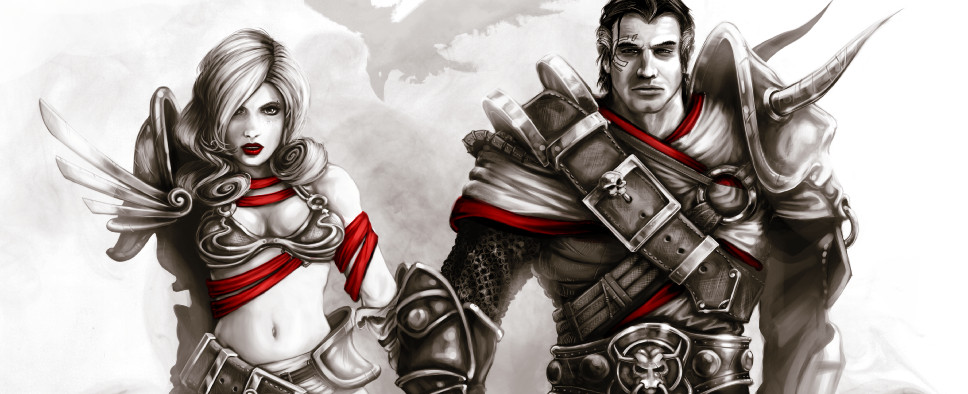Divinity: Original Sin Interview
-
Category: News ArchiveHits: 1346

There's fairly long and interesting interview with Swen Vincke over at Rock, Paper, Shotgun, which mostly focuses on Divinity: Original Sin, but also offers some enlightening insights into Larian's M.O. and future plans. Here's a snippet:
RPS: Conventional wisdom used to say that no one wanted these sorts of games anymore. And you've gone from making Ego Draconis, which was much more an RPG fused with an action game to Original Sin. But this is like, by many standards, a niche within a niche. You're making a very specific type of game. Are you at all worried about a worst case scenario? A small crowd buys it and loves it, and everyone else says, (eh, not my thing)?
Vincke: Yeah. But you know, they've always said that about every single game I've made. From Divinity 1 onward. They went on to sell really a lot of units. We've calculated Divinity II sales at, what, 1.3 million units? That's not a small crowd anymore. Divinity 1 must be over a million units now if you take the entire life cycle into account. That's a lot of people already. I refuse to believe that our players currently are the only ones who want to have an evolution of the RPG genre as it existed and that was cut off. It was cut off because it turned out that the action-RPGs sold easier and were easier to make.
I personally think that, in the early 2000s, RPGs were cut off, because there were a number of production values that went up, and it was impossible to. Well, it was possible, but it was decided not to do it by the powers that be. So the genre stopped evolving. This was the case for a lot of genres. Now we have the resurgence of the indies. We have Steam Early Access and Kickstarter. Suddenly we have games that nobody would have ever invested in. Like Wasteland 2, for instance. Do you really think a publisher would have put a dollar into that? No. Look at it, how it's soaring up the charts. That's conventional wisdom for you.
The guys that have the conventional wisdom, I'm sorry, but I never agreed with them back then and I still don't agree with them nowadays. It's easy to go along the beaten path, but then you're not going to have any evolution in games. You'll have rehashes of the same thing over and over. There's a lot of gamers out there, more gamers than ever, and they're looking for a little bit more intelligent content. That's where we want to be with this one.
Plus, the fact that I really think that people, when it's going to release, are going to. The Trojan Horse in this particular case is co-op. Like that guy I was telling you about. His blog entry was exactly what we were hoping for when we envisioned the game originally. He starts playing and says to his wife, why don't you try it? Then they don't go to sleep. They keep on playing until the sun comes up. They have their own adventure, a kind of adventure that they probably wouldn't have if they'd been playing single-player and loading and saving and loading and saving. That's quite a feat, actually, that people don't just load the game and continue. They debate with one another. Are we going to a load? That's pretty cool.
...
RPS: Speaking of that, do you see yourself going back to Kickstarter in the future?
Vincke: I think so, because what we've gotten from the community there. There's a lot of advantages that we had. We had a lot of word of mouth, which was worth it on its own. Sites like Rock Paper Shotgun, even, you guys talked more about us since we were on Kickstarter. Before that, we didn't have that attention, even with publishers. So there's that. Then the community feedback that we've been getting, especially the behind the scenes community feedback, which you don't necessarily see in the big campaigns like Early Access or on Facebook.
We get really long, detailed emails with really good ideas and suggestions on how to solve things. Or people who say, I really like this game, and here's what happened to me and what went wrong. You get this dialogue going on, and it's worth its weight in gold. It's worth 10,000 QA departments, basically. You have 20,000 Kickstarters. That's also why we gave the alpha version to all of them. I think that out of the 20,000, 13,000 actually activated their alpha version to try it out, and they gave us feedback, because we're collecting crash reports and stuff like that. It's enormously helpful on that front.
The financial side, actually, surprisingly, is the least interesting part of it. Obviously it helps, but it's not sufficient to drive forward a team of 40 people for so many months. If you do a quick calculation this is very underestimated let's say 5,000 euros for 40 people, that's 200,000 euros, which gives you five months of work for a million euros. Or even less, more like four months of work. You obviously can't do that. But the advantages in QA, the advantages from word of mouth, are worth their weight in gold.

